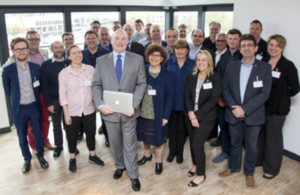5G Smart Tourism
This tourism 5G testbed used technology to offer tourists new experiences

The 5G Smart Tourism project tested whether new 5G applications could deliver innovative and enhanced tourist Augmented Reality/Virtual Reality (AR/VR) experiences in major attractions in Bath and Bristol, including the Roman Baths and Millennium Square. The aim was to explore whether these trials could lead to an increased number of visitors and generate new revenue streams. The project also explored whether 5G could be used to keep visitors safe in emergency situations, providing efficient communications with emergency services.
Key findings

December 2018 - Roman Baths Trial
- The project managed to demonstrate the benefits of network slicing as a more effective way to share infrastructure and using the same unlicensed spectrum with other services. This enabled better emergency response to unexpected incidents during busy, public events such as the Bristol Harbour Festival.
- A survey commissioned by Digital Catapult suggests that 5G could boost cultural and economic value in the tourism sector in cities across the UK by bringing together mobile network operators, creative tech businesses and Destination Management Organisations.
- With 5G’s high speed, the BBC successfully tested its first public trial of AR application to over a 100 visitors who could see the Roman Baths throughout its history by streaming 360 video content over the project’s network.
- Using 5G’s low latency capabilities, the project managed to deliver the world’s first 5G music lesson , connecting musicians remotely in London, Birmingham and Bristol to play together. This concept is now being explored further with the 5G Festival project in the Brighton Dome and at the O2 Arena.
The world’s first 5G music lesson
Use cases
- Network Slicing could be a key enabler for multiple 5G use cases as well as other technologies to run on the same unlicensed spectrum. For example, the project used network slicing to ensure emergency services were allocated a section of the spectrum to enable them to respond quickly to an incident in a public event or crowded place.
-
AR/VR applications in museums, art galleries and tourist attractions enhanced visitor’s experiences.
- Positive engagement through accessible sites, such as museums, helped users understand and engage with new 5G technology in a better way.
- At these sites the project found that users benefited from demonstrations and support in order to get the most positive visitor experience from the new technology.
- Feedback from invited users from the 5G ecosystem at the Roman Baths BBC AR trial was overwhelmingly positive, with around 90% of the 92 users surveyed saying they would be more likely to visit a museum that offered similar reconstructions.
- 5G’s low latency and larger data capacity allowed streaming of high definition (4K) synchronised 360 degrees video content to hundreds of users in the same location at the same time. This was successfully achieved at the Bristol Harbour Festival in July 2019.
- In a user feedback survey for this trial over a quarter of the 37 respondents said they would be willing to pay for similar AR/VR services to enhance their experience (£3-£7).
- Around 80 users were able to experience the Mo-Sys AR of seeing an Airbus A430-200 aircraft up close and personal.
- Other areas which showed promising results in Smart Tourism project include security and public safety, where:
- High resolution camera footage and sensors can be combined to keep track of assets and detect when people are where they shouldn’t be (e.g. in the water, fences broken through).
- These use cases are being explored further in the 5G Logistics and 5G Rural Dorset projects.
Reports
- 5G Smart Tourism Overview - An overview on the Smart Tourism project, its aims and objectives.
- Turning On the Lights - A survey analysing whether tourist locations were interested in using 5G. The report concludes that 5G could bring benefits to the tourism sector.
- Mobile Augmented Reality Using 5G: A trial at the Roman Baths in the 5G Smart Tourism project - White paper from the BBC summarising the technical developments at the trials at the Roman Baths.
Please find more information on the UK5G Smart Tourism page.
Project partners
- West of England Combined Authority (lead)
- Bristol City Council
- Bath & North East Somerset Council
- BBC
- Cambridge Communications Ssystems (CCS) Ltd
- IBI Group (UK) Ltd
- BritolIsOpen Ltd
- 3Sixty Design Ltd
- Destination Bristol
- Digital Catapult
- Grand Appeal
- LandMark Ltd
- Interdigital Europe Ltd
- Aardman Studios
- Roman Baths
- University of Bristol
- Mo-Sys Engineering Ltd (camera tech company)
- Bristol Futures Global (smart city consultancy)
- Watershed Arts Trust Ltd
- Zeetta Networks
- Mativision
- M-Shed
- Smartify
More information on the project can be found here.
Updates to this page
-
Updated case study.
-
First published.